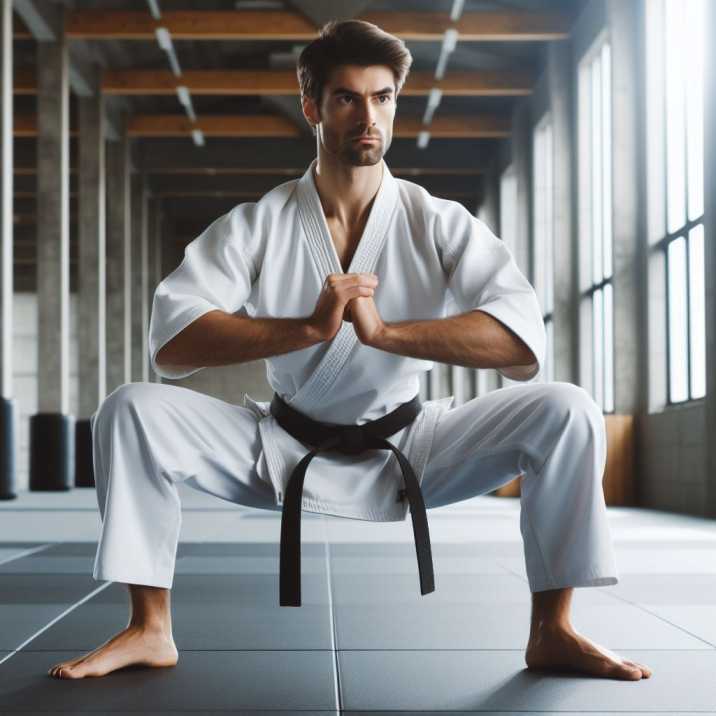Introduction:
Table of Contents
Balance in Karate is not just about physical stability; it’s a harmonious blend of mental focus, body alignment, and agility. From stances to techniques, every aspect of Karate revolves around achieving and maintaining balance. In this extensive guide, we delve deep into the core principles of balance in Karate, offering valuable insights for practitioners at every level.
Understanding Balance in Karate:
Balance in Karate refers to the ability to maintain equilibrium while executing various techniques, strikes, and movements. It involves the coordination of body weight, proper posture, and controlled breathing. Achieving balance is essential for generating power, enhancing agility, and executing precise strikes.

Key Principles of Balance in Karate:
Stance Alignment:
- The foundation of balance in Karate lies in the proper alignment of the stance.
- Maintain a stable, evenly distributed weight between both feet.
- Ensure alignment of the hips, shoulders, and feet in the direction of movement.
Center of Gravity:
- Understanding and controlling your center of gravity is crucial for balance.
- Keep your center of gravity low and centered between your feet.
- Shift your center of gravity smoothly to adjust to different techniques and movements.
Core Strength:
- A strong core provides stability and balance during Karate movements.
- Incorporate core strengthening exercises into your training regimen.
- Engage your core muscles to support your posture and movements.
Mind-Body Connection:
- Balance in Karate is as much mental as it is physical.
- Cultivate focus and mindfulness to enhance your awareness of body positioning.
- Visualize your movements and anticipate shifts in balance to maintain control.
Breathing Technique:
- Proper breathing is essential for maintaining balance and controlling energy.
- Practice synchronized breathing with your movements.
- Focus on deep, controlled breaths to remain calm and centered.
Weight Distribution:
- Distribute your weight evenly between both feet for optimal balance.
- Shift weight smoothly between feet during transitions and techniques.
- Avoid leaning too far forward or backward, maintaining a balanced distribution.
Dynamic Balance:
- Balance in Karate is dynamic and constantly evolving.
- Adapt to changes in terrain, opponent’s movements, and various training environments.
- Develop agility and flexibility to adjust your balance fluidly during combat or practice.
Information-Based Table:
| Principle | Description |
|---|---|
| Stance Alignment | Maintain stable, aligned stance with hips, shoulders, and feet. |
| Center of Gravity | Keep center of gravity low and centered between feet. |
| Core Strength | Strengthen core muscles for stability and balance. |
| Mind-Body Connection | Cultivate mental focus and awareness of body positioning. |
| Breathing Technique | Practice synchronized breathing for energy control. |
| Weight Distribution | Evenly distribute weight between feet, avoid leaning excessively. |
| Dynamic Balance | Adapt to changes in environment and opponent’s movements. |
Conclusion:
Mastering balance in Karate is a journey that requires dedication, practice, and a deep understanding of its core principles. By focusing on stance alignment, center of gravity, core strength, and the mind-body connection, practitioners can enhance their stability, agility, and overall performance. With consistent training and mindfulness, achieving optimal balance becomes attainable, empowering Karate practitioners to excel in their practice and beyond.
FAQs:
- What role does balance play in Karate?
- Balance is essential in Karate for stability, power generation, and precise execution of techniques. It enables practitioners to maintain control over their movements and respond effectively to various situations.
- How can I improve my balance in Karate?
- Practice foundational stances, core strengthening exercises, and mindfulness techniques. Focus on proper alignment, weight distribution, and controlled breathing to enhance your balance gradually.
- Is balance more important than strength in Karate?
- Balance and strength are interconnected in Karate. While strength is important for generating power, balance is crucial for executing techniques with precision and efficiency. Both aspects complement each other for optimal performance.
- Can age affect one’s balance in Karate?
- Age can impact balance to some extent, but consistent training and focus on foundational principles can help individuals maintain and improve their balance regardless of age. Adaptations may be necessary based on individual capabilities and limitations.
- How does balance contribute to self-defense in Karate?
- In self-defense situations, balance allows practitioners to maintain stability while evading attacks or executing defensive maneuvers. It enables quick reactions and effective counterattacks, increasing the chances of successfully defending oneself.


